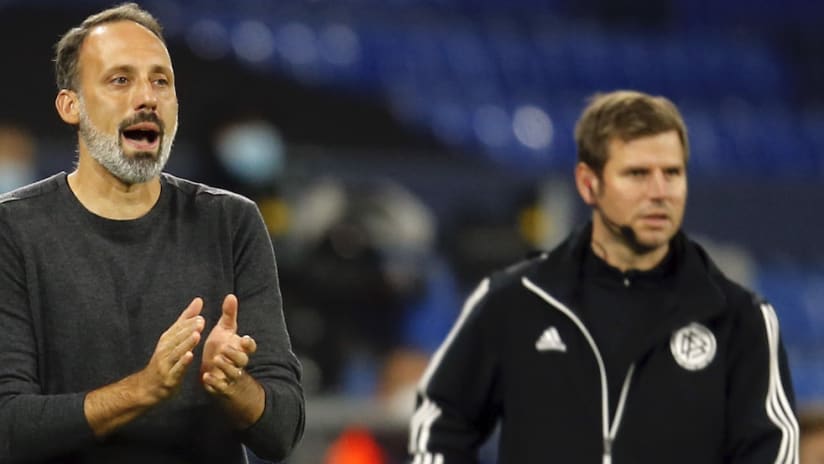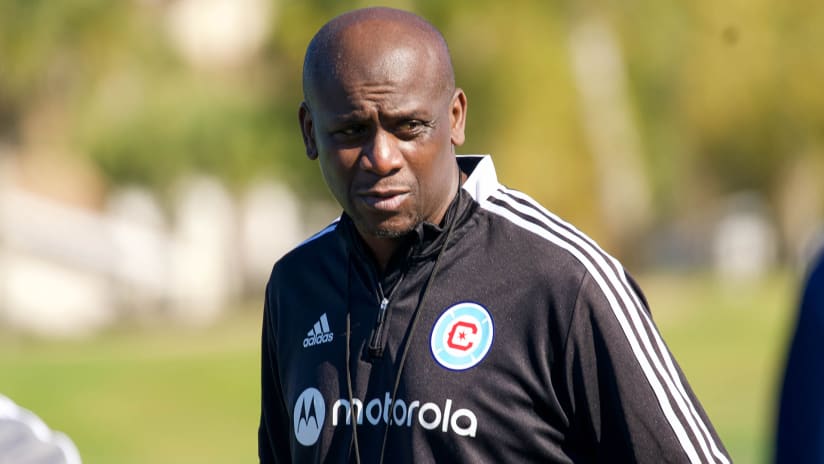While other Americans who've been hired to prominent managing jobs in Europe have traveled a different path, it's quite accurate to say Stuttgart boss Pellegrino Matarazzo got where he is today the old-fashioned way.
Red Bull Salzburg's Jesse Marsch had two MLS head coaching posts with the New York Red Bulls and Montreal Impact, as well as an assistant coach stint with sister club RB Leipzig, before taking his current reins. Bob Bradley had experience encompassing over 300 games as an MLS top man and two stints as a national team manager (including one World Cup odyssey) before getting his first Old World shot at Stabæk.
With Matarazzo, the story has been more akin to a restaurant busboy who eventually works his way up to head chef. The New Jersey native's journey started 10 years ago at FC Nuremberg, where he held about every staff job one can think of. He was a reserve team assistant, fitness coach, rehab coach, player development curriculum author and boss of both the Under-17 and Under-19 sides.
"The first years of my coaching career I was soaking in all I could about the sport in all directions," Matarazzo told MLSsoccer.com by phone from Stuttgart. "I was getting a very wide basis. The further you go up the ladder, the more concentrated you need to be.”
He made the jump to Hoffenheim in 2017 to coach their U-17 team, but that stint only lasted 15 games because first team manager Julian Nagelsmann promoted Matarazzo to be his right hand man. Both men prefer quick-action soccer, both with and without the ball, and the pairing proved fruitful.
"My experience with Julian was fantastic," Matarazzo recalled fondly. "We always shared a similar approach to the game. It was a good working relationship.”
It was also his first time working full time with adult players, after so many years in the development structure. This was a very important lesson for a guy trying to reach the top of the ladder.
"I learned in my time at Hoffenheim to deal with the professional player," said Matarazzo. "It's a lot different working with 25-year-olds that have Bundesliga experience and national team caps than it is working with 18-year-old hungry youth players. I learned to convince them with character and content.”
After two years at Nagelsmann's side, he was tabbed by Stuttgart to take over their storied side two days before this past New Year's Day. Many coaches who walk a similar path to first team jobs talk about how climbing the ladder rungs gets progressively tougher, but Matarazzo didn't see it that way.
"I wouldn't say that the jumps get harder, but the jumps get more intense," he explained. "The work is extremely focused, extremely precise.
"You need to be very in tune with yourself and the task at hand in order to make the right decisions at the right moment. It's more about quality than it was before. There's no room for mistakes.”
Happily for both Matarazzo and Stuttgart, the mistakes were few and far between during his first half-season in charge of the then-second flight side.
The Schwabians had been preseason co-favorites to earn promotion, but felt the need to make a change at the helm after heading into the winter break on a 3-5-2 run. Tim Walter was let go, and Matarazzo was handed a first team managing job for the first time. Stuttgart responded quickly to the new boss, winning four of their first five matches.
A two-month COVID-19 pause in the schedule did the club no favors, but when all was said and done they'd gone 8-5-3 under Matarazzo to claim second place, and the automatic promotion elevator that came with it.
Despite having finally reached an enviable coaching pinnacle, he has maintained much of the teaching mindset he had while coming up through the ranks. Many managers talk about how first team jobs require a result-oriented approach, but Matarazzo doesn't see it that way.
"I don't think I'm chasing results," he stated. "I think I'm chasing performance to gain results. I still consider myself a developer, and that's regardless of whether the player is 17 or 33. Everyone, at all ages, is capable of learning something new or activating a new element in their repertoire.
"I take myself as an example. When I went to Nuremberg's U-23 squad, I probably improved more there than I had in the first five years I played in Germany. I was 26, 27, but you never really stop learning.”
The same goes for coaches. Finding the balance between installing their ideal system and making the best use of the players in the clubhouse is tricky. For Matarazzo, being flexible and evaluating well are key to this process.
"I think it's very complex," he said. "I don't come to the club saying 'This is the type of football that I want to play'. I come to the club with an idea of the strengths of the players, what they can and can't do.
"I have an idea of who I am, what I stand for, what my values are. And then I try to create a football that fits me as a coach and fits my players, and one that the club and fans can identify with. It's an organic process.”
And what of the process of making his way up the coaching ladder in a foreign country? Matarazzo being American is common knowledge in Bundesliga circles ("I think it's more known in Germany than it is in the United States," he chuckled), but he doesn't feel that fact has been prohibitive in his career. It has simply been one challenge among many along the way, and that's fine by him.
"I would say it wasn't easy being someone without 100 national team games under my belt, or 200 Bundesliga games, or being a native speaker," he admitted. "It wasn't easy getting to where I am. There's always a bit of luck involved to get a chance, but I'm not unhappy with the chances I've had.”
It's a healthy attitude that makes sense. After all, those chances have led him to a dream post as manager of one of the most successful Bundesliga clubs of all-time. One might also wonder if his bucket list includes coaching back in America, either in MLS or with the US national team. The short answer: the 42-year-old is "open to everything" but understandably focused on the plenty exciting now.
"Soccer's a very fast business, and I have family in the States," said Matarazzo. "I grew up in the States, so there's still a part of me in the States. There is a thought that I want to go back, but I'm at a point right now where I just want to be the best I can as coach of Stuttgart.”
Obviously, it's so far, so good with that aim. Stuttgart have followed up the promotion success with a solid start to the new season. They haven't lost since opening day, and now stand eighth through seven rounds. They also own the sixth-best goal differential in the Bundesliga.
"The mission is definitely to stay in the league," he asserted, defining the bare minimum he wants to accomplish this season. "Being that we have just been promoted and that we're playing with a young team, the ambition is to go into every game with the intensity and the energy to win it, to ruffle as many feathers as we can.”
Considering how he got to the Stuttgart dugout, nobody should go betting against Matarazzo if ruffling feathers against the odds is the game. In that arena, he has loads of experience.













